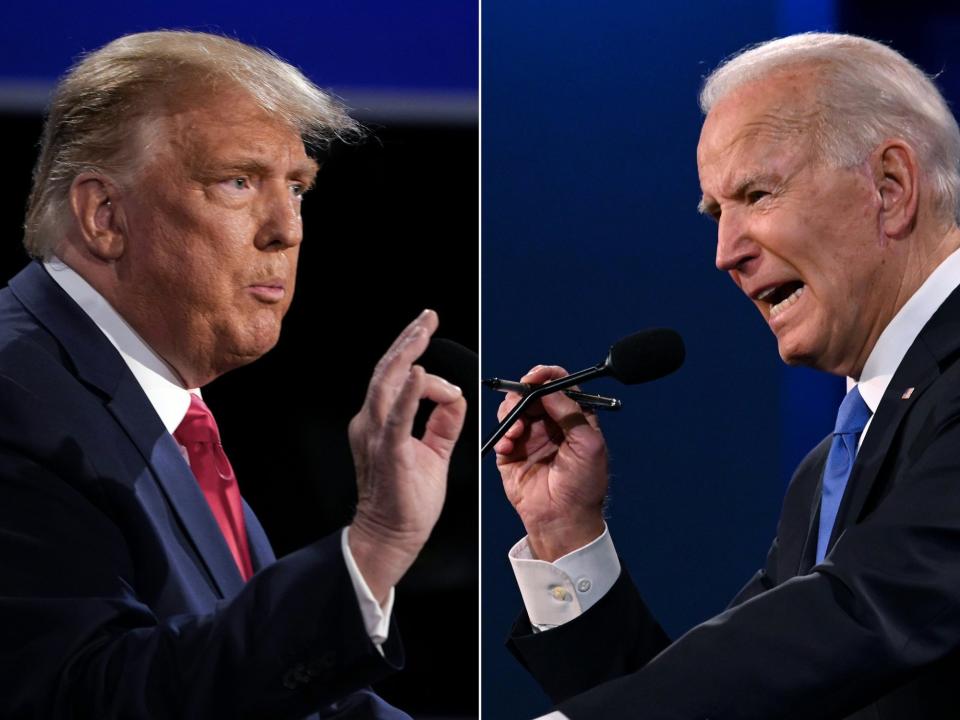China needs to work for more 'visible' deliverables before US presidential election: expert
Beijing should ramp up efforts to achieve "visible" deliverables with Washington to avoid a rapid escalation of animosity before the US presidential election in November, a Chinese expert on international relations has warned.
Although strained, ties between the two countries appear to have stabilised in recent months, but observers have yet to see concrete steps by Washington to address ongoing challenges, according to An Gang, non-resident fellow at the Centre for International Security and Strategy at Tsinghua University.
Instead, the Biden administration has launched more restrictive measures against Beijing, stemming from both domestic election politics as well as its global strategy, he wrote in an article circulated on a WeChat channel on Thursday.
Do you have questions about the biggest topics and trends from around the world? Get the answers with SCMP Knowledge, our new platform of curated content with explainers, FAQs, analyses and infographics brought to you by our award-winning team.

A "worst-case scenario" is Donald Trump returning as US president and resetting the progress in relations between China and the US to "zero", An Gang says. Photo: AFP alt=A "worst-case scenario" is Donald Trump returning as US president and resetting the progress in relations between China and the US to "zero", An Gang says. Photo: AFP>
"Many in the Chinese and American academic community think that the relationship between the two countries is entering 'garbage time' from now until the next [US] president is elected," An said.
The widely used sports term refers to a period towards the end of a game in which one side has such an insurmountable lead, meaning the outcome is not in doubt and the players tend to become passive.
In terms of China-US relations, An said "garbage time" meant that all dialogue was superficial, problem-solving was low, effective cooperation was hard to achieve, and domestic political disruptions were deepening, stalling efforts to fulfil the consensus reached at the Xi-Biden summit in California in November.
"The problem is that 'garbage time' will only lead to worse outcomes," he warned.
An struck the cautionary tone as both Beijing and Washington demonstrated their commitments to stabilising bilateral ties by continuing high-level talks, working groups and negotiations on the economy, finance, trade, climate, drug control and military affairs.
Recent examples have included a video call between China's minister of public security and the US homeland security secretary to discuss cooperation on counternarcotics earlier this month, the first official meeting in two years between the countries defence chiefs in late May, and the visit by Chinese foreign vice-minister Ma Zhaoxu to America three weeks ago.
But observers said that they had seen few tangible results from those interactions.
Meanwhile, Washington has further angered Beijing by slapping new tariffs on Chinese imports, approving additional arms sales to Taipei, more vocally blaming China for supporting Russia's military-industrial base, and reportedly lobbying Japan and the Netherlands to further tighten chip restrictions on the world's No 2 economy.
An said he expected that US President Joe Biden would take a harder line against China on trade, technology, Taiwan and the South China Sea, causing "new and irreversible damage" to bilateral relations if he struggled in the rematch with his predecessor Donald Trump.
"The worst-case scenario is Trump returning to office ... resetting the consensus on stabilisation and the remaining dialogue mechanisms between the US and China to zero," he added.
If Trump returned to the White House, he should "seek to decouple [the US] economy from China's", his former national security adviser, Robert O'Brien, wrote in an article published on Foreign Affairs website on Tuesday.
An, who used to work for China's foreign ministry, argued that "the real danger" in Sino-US relations was the continued deepening of views that saw each other as enemies.
He warned that the "garbage time" would only increase those hostilities if the two countries were to stay hands-off on the pressing issues between them.
China and the US "have been clear that they are each other's primary competitors. There is only one wall that stands between being competitors and being enemies, and that wall is made of paper," he said.
With the US presidential election less than five months away, An called on China to take more concrete action to strengthen various exchange and cooperation channels with the US at national, subnational and civilian levels.
He urged more work in the areas of trade and finance to achieve bilateral arrangements, and for the timely establishment of military hotlines and emergency management networks that match the dynamics of China-US competition.
He also encouraged increasing the incentives to restore people-to-people exchanges as quickly as possible so that they approach pre-Covid levels.
"It is also necessary to continue to promote cooperation in areas such as fentanyl control, as well as to deepen the intergovernmental and [backchannel diplomacy] Track 2 dialogue on AI to achieve more visible results," he said.
At the same time, An also called on Beijing to accelerate domestic reforms and technological innovation to further fortify China's resistance to counter external risks.
This article originally appeared in the South China Morning Post (SCMP), the most authoritative voice reporting on China and Asia for more than a century. For more SCMP stories, please explore the SCMP app or visit the SCMP's Facebook and Twitter pages. Copyright © 2024 South China Morning Post Publishers Ltd. All rights reserved.
Copyright (c) 2024. South China Morning Post Publishers Ltd. All rights reserved.

 Yahoo Finance
Yahoo Finance 